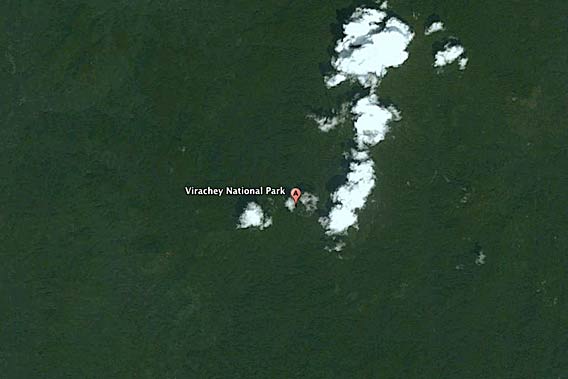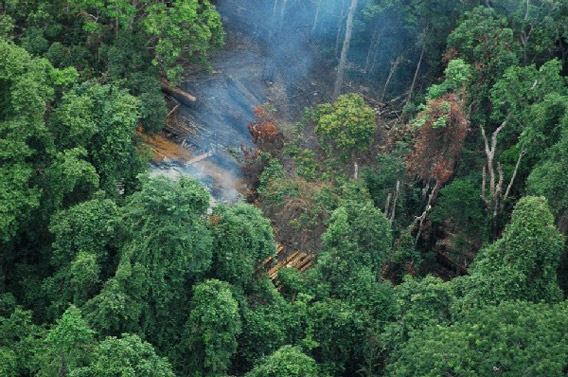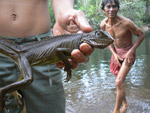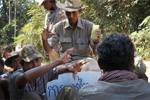
A portion of Virachey National Park as viewed by Google Earth in Cambodia. Last year Cambodian Prime Minister, Hun Sen, approved a 9,000 hectare (22,200 acre) rubber plantation inside the park as apart of the government’s economic land concessions.
Cambodian Prime Minister Hun Sen announced today that Cambodia would be temporarily suspending new economic land concessions and would revoke any concessions from companies involved in illegal logging, the evictions of locals or land-grabbing. The announcement comes two week after the high-profile death of local forest activist, Chut Wutty, who was shot and killed by military police while investigating illegal logging with two journalists.
In a statement the Cambodian government said the suspension of land concessions was due to a “necessary and urgent need to guarantee equity and to strengthen the effectiveness of granting economic land concessions”.
Recently Cambodia has handed out a slate of massive land concessions to private corporations—including a number in national parks and on local lands—leading to conflict with local communities, outcries from conservationists, and large-scale protests.
According to the the Cambodia Human Rights and Development Organization (Adhoc), two million hectares (4.9 million acres) have been handed off to foreign corporations for logging, mining, agriculture, and other development, comprising over 10 percent of Cambodia’s total land area. Another human rights group, Licahdo, estimates that half of Cambodia’s arable land is now in the hands of foreign corporations.
Chut Wutty, head of the National Resources Protection Group, spent his life fighting deforestation, illegal logging, and most recently the booming practice of economic land concessions. His untimely death, which has produced several official but conflicting accounts of what happened, has outraged activists in Cambodia and shed new light internationally on rising deforestation in the Southeast Asian country.
Despite the announcement from the Cambodian government, human rights activists remain wary.
“There are still disputes with even stronger protests to come,” Chan Soveth with Adhoc told Reuters.
According to the Food and Agriculture Organization (FAO), Cambodia lost 22 percent of its forest cover between 1990 and 2010, an area larger than Haiti. As of 2010, around 57 percent of the country was covered in forest, but only 3.2 percent of this was primary forest.
Conservation International (CI) has labeled the forests of the Indo-Burma region (comprising Cambodia, Vietnam, Laos, Thailand, Myanmar, and parts of India) as the world’s most imperiled. Only 5 percent of the region’s historical forests remain.

Aerial view of illegal logging in Koh Kong Province where forest activist, Chut Wutty, was shot dead today. Photo by: Paul Mason USAID/Cambodia/OGD.
Related articles

(05/03/2012) Abandoned by NGOs and the World Bank, carved out for rubber plantations and mining by the Cambodian government, spiraling into a chaos of poaching and illegal logging, and full of endangered species and never-explored places, Virachey National Park may be the world’s greatest park that has been written off by the international community. But a new book by explorer and PhD student, Greg McCann, hopes to change that. Entitled Called Away by a Mountain Spirit: Journey to the Green Corridor, the book highlights expeditions by McCann into parts of Virachey that have rarely been seen by outsiders and have never been explored scientifically, including rare grasslands that once housed herds of Asian elephants, guar, and Sambar deer, before poachers drove them into hiding, and faraway mountains with rumors of tigers and mainland Javan rhinos.
Assassinated forest activist Chut Wutty: ‘I want to see people live with freedom’

(05/02/2012) Chut Wutty, a dedicated Cambodian activist, was shot dead at an illegal logging site by military police, last Thursday. At the time Wutty was driving with two journalists, who wrote a shocking eye-witness account of his death, revealing that he was physically and verbally abused, then shot whilst trying to drive away, and left to die. His death reveals the brutal power of logging syndicates and companies, which are looting the country’s natural wealth, and employing the military to silence their opponents.
Forest activist shot dead in Cambodia allegedly over photos of illegal logging
(04/26/2012) Chut Wutty, a prominent activist against illegal logging and deforestation, has been killed in the Koh Kong province of Cambodia. Wutty was shot dead at a military police checkpoint while traveling with two journalists with The Cambodia Daily. The journalists are currently being held for questioning by the military police.
Blood rosewood: Thailand and Cambodia team up to tackle illegal logging crisis and save lives
(04/11/2012) Cambodian and Thai officials have agreed to work together to combat illegal logging of rosewood and resulting violence between Cambodian loggers and Thai rangers, reports MCOT online news. Officials with both nations met on Tuesday and spent three hours discussing the issue.
Cambodia sells off national park for city-sized pleasure resorts
(03/19/2012) The Cambodian government has handed over nearly 20 percent of Botum Sakor National Park to a Chinese real-estate firm building a massive casino and resorts in the middle of pristine rainforest, reports Reuters. The city-sized resorts, costing $3.8 billion, will include a 64 kilometers highway, an airport, hotels, and golf courses. Botum Sakur is home to a number of endangered species including the pileated gibbon (Hylobates pileatus) and Asian elephant (Elephas maximus).
Picture of the day: nearly-extinct turtle released into the wild in Cambodia
-small.150.jpg)
(01/18/2012) Only around 200 southern river terrapins (Batagur affinis) survive in the wild, but today at least the species got some good news. A female terrapin was released back into the Sre Ambel River with much fanfare after being caught by a local fishermen in Cambodia.














